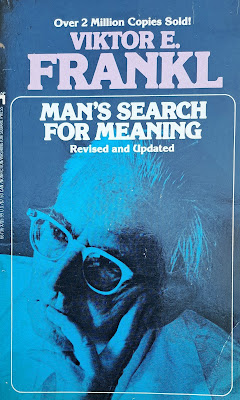This is the first of a series of occasional podcasts focused on what I consider to be a "classic paperback". A classic paperback is one that has influenced a generation of readers and has sold phenomenally well (although classics aren't always bestsellers). These are paperbacks that changed our worldview significantly and are still relevant for contemporary readers.
Our choice for this episode is Victor E. Frankl's Man's Search for Meaning. It was first published in German in 1946, then in English in 1953 (hardback). The first paperback publication was by Pocket Books in 1963. Since its initial publication, Man's Search for Meaning has never been out of print and the book still continues to be taught in high school and college English/History courses. Of course, general readers still read it and are moved by the book as were readers in 1946.
Victor Frankl in 1965
We cover Victor Frankl's background in the first part of the podcast. You can find out more about him at the Victor Frankl Institute website and on wikipedia. Briefly, he studied Psychology before WWII in Vienna but was rounded up by the Nazis, along with his wife and father. He spent 3 years in various concentration camps and survived miraculously. After the war, he returned to Vienna where he wrote Man's Search for Meaning in 9 days. He also received his doctorate in Psychology and worked in Vienna as a therapist and counselor.
Man's Search for Meaning became a phenomenal bestseller and launched Frankl on speaking tours where he elaborated on his theories of Logotherapy, a therapeutic practice that focused on finding meaning in one's life. Frankl wrote 33 other books, but none as powerful and as popular as Man's Search for Meaning. Victor Frankl died in 1997, but his ideas live on at the Victor Frankl Institute. Millions of people continue to read his books and try to help themselves with Frankl's ideas and personal examples.
SHOW NOTES
This podcast features a short biographical introduction on Victor Frankl and the background of the paperback publication of his book, Man's Search for Meaning, in 1963. In the second half, we bring in author/editor Lauren Elise Daniels to discuss Frankl and his brilliant book. We talk about the impact of the book on 1960s readers and thinkers, discuss why the book is so important, and address some of the criticism of the book especially by Holocaust scholars. Finally, we examine several decades of covers for Man's Search for Meaning and talk about the symbols used in the cover design.
Most of the information I discovered was from the Victor Frankl Institute, papers published in scholarly journals, and from Wikipedia article on Frankl. A biography of this great man is long overdue.
Youtube is filled with interviews with Victor Frankl as he was not shy about promoting himself and his ideas.
Man's Search for Meaning in Paperback.
Pocket was the first to reprint Man's Search for Meaning in 1963 (see cover above). Every decade there was a new cover for the reprint. Every paperback publication to the present day has multiple print runs. The book was translated into dozens of different languages and is popular in paperback all over the world. There was a revised edition published in 1998 which included additional material (primarily a lecture by Frankl) on Logotherapy.


Beacon Press 2006

Pocket Books 1971![]()

Pocket Books 2008

Pocket Books 2023







